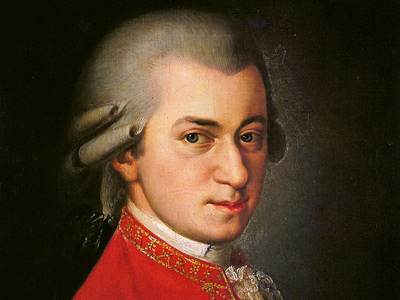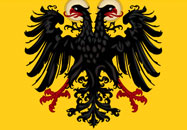Wolfgang Amadeus Mozart (1756-1791)
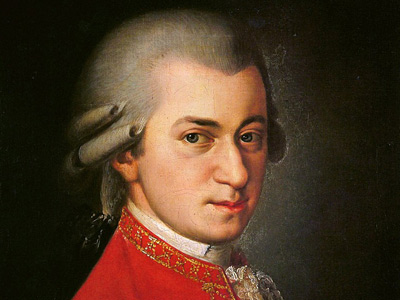
Family and Childhood
Wolfgang Amadeus Mozart was born on 27 January 1756 to Leopold Mozart (1719–1787) and Anna Maria, née Pertl (1720–1778), at 9 Getreidegasse in Salzburg. This was the capital of the Archbishopric of Salzburg, an ecclesiastic principality in what is now Austria Austria, formally the Republic of Austria, is a country in the southern part of Central Europe, lying in the Eastern Alps. After the dissolution of the Holy Roman Empire in 1806, Austria established its own empire, which became a great power and the dominant member of the German Confederation. The empire's defeat in the Austro-Prussian War of 1866 led to the end of the Confederation and paved the way for the establishment of Austria-Hungary a year later., then part of the Holy Roman Empire
Austria, formally the Republic of Austria, is a country in the southern part of Central Europe, lying in the Eastern Alps. After the dissolution of the Holy Roman Empire in 1806, Austria established its own empire, which became a great power and the dominant member of the German Confederation. The empire's defeat in the Austro-Prussian War of 1866 led to the end of the Confederation and paved the way for the establishment of Austria-Hungary a year later., then part of the Holy Roman Empire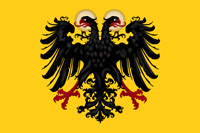 The Holy Roman Empire was a political entity in Western, Central, and Southern Europe that developed during the Early Middle Ages and continued until its dissolution in 1806 during the Napoleonic Wars. From the accession of Otto I in 962 until the twelfth century, the Empire was the most powerful monarchy in Europe. The empire reached the apex of territorial expansion and power in the mid-thirteenth century, but overextending led to partial collapse.. He was the youngest of seven children, five of whom died in infancy. His elder sister was Maria Anna Mozart (1751–1829), nicknamed "Nannerl". Mozart was baptized the day after his birth, at St. Rupert's Cathedral in Salzburg. The baptismal record gives his name in Latinized form, as Joannes Chrysostomus Wolfgangus Theophilus Mozart. He generally called himself "Wolfgang Amadè Mozart" as an adult, but his name had many variants.
The Holy Roman Empire was a political entity in Western, Central, and Southern Europe that developed during the Early Middle Ages and continued until its dissolution in 1806 during the Napoleonic Wars. From the accession of Otto I in 962 until the twelfth century, the Empire was the most powerful monarchy in Europe. The empire reached the apex of territorial expansion and power in the mid-thirteenth century, but overextending led to partial collapse.. He was the youngest of seven children, five of whom died in infancy. His elder sister was Maria Anna Mozart (1751–1829), nicknamed "Nannerl". Mozart was baptized the day after his birth, at St. Rupert's Cathedral in Salzburg. The baptismal record gives his name in Latinized form, as Joannes Chrysostomus Wolfgangus Theophilus Mozart. He generally called himself "Wolfgang Amadè Mozart" as an adult, but his name had many variants.
Leopold Mozart, a native of Augsburg, Germany, was a minor composer and an experienced teacher. In 1743, he was appointed as fourth violinist in the musical establishment of Count Leopold Anton von Firmian, the ruling Prince-Archbishop of Salzburg. Four years later, he married Anna Maria in Salzburg. Leopold became the orchestra's deputy Kapellmeister in 1763. During the year of his son's birth, Leopold published a violin textbook, Versuch einer gründlichen Violinschule, which achieved success.
When Nannerl was 7, she began keyboard lessons with her father, while her three-year-old brother looked on. Years later, after her brother's death, she reminisced:
He often spent much time at the clavier, picking out thirds, which he was ever striking, and his pleasure showed that it sounded good.... In the fourth year of his age his father, for a game as it were, began to teach him a few minuets and pieces at the clavier.... He could play it faultlessly and with the greatest delicacy, and keeping exactly in time.... At the age of five, he was already composing little pieces, which he played to his father who wrote them down
These early pieces, K. 1–5, were recorded in the Nannerl Notenbuch. There is some scholarly debate about whether Mozart was four or five years old when he created his first musical compositions, though there is little doubt that Mozart composed his first three pieces of music within a few weeks of each other: K. 1a, 1b, and 1c.
In his early years, Wolfgang's father was his only teacher. Along with music, he taught his children languages and academic subjects. Solomon notes that, while Leopold was a devoted teacher to his children, there is evidence that Mozart was keen to progress beyond what he was taught. His first ink-spattered composition and his precocious efforts with the violin were of his own initiative, and came as a surprise to Leopold, who eventually gave up composing when his son's musical talents became evident.
HISTORY
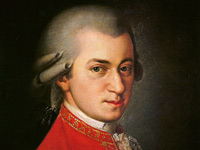
RESOURCES
This article uses material from the Wikipedia article "Wolfgang Amadeus Mozart", which is released under the Creative Commons Attribution-Share-Alike License 3.0.
© Stories Preschool. All Rights Reserved.
